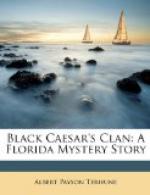As she talked they passed out of the grapefruit grove, and came to a plantation of orange trees.
“These are the joy of Milo’s heart,” she said with real pride, waving her little hand toward the well-ranked lines of blossoming and bearing young trees. “Last year he cleared up from this five-acre plot alone more than—”
“Excuse me,” put in Gavin. “I don’t mean to be rude. But since he’s made such a fine grove of it and takes such pride in its looks. why doesn’t he send a man or two out here with a hoe, and get rid of that tangle of weeds? It covers the ground of the whole grove, and it grows rankly under every tree. If you’ll pardon me for saying so. it gives the place an awfully unkempt look. If—”
Her gay laugh broke in on his somewhat hesitant criticism.
“Say that to any Floridian,” she mocked, “and he’ll save you the trouble of looking for work by getting you admitted to the nearest asylum. Why Milo fosters those weeds and fertilizes them and even warns the men not to trample them in walking here. If you should begin your work for Milo by hoeing out any of these weeds he’d have to buy weed-seeds and sow them all over again. He—”
“Then there’s a market for this sort of stuff?” he asked, stooping to inspect with interest a spray of smelly ragweed. “I didn’t know—”
“No,” she corrected. “But the market for our oranges would slump without them. Here in the subtropics the big problem is water for moistening the soil. Very few of us irrigate. We have plenty of water as a rule. But we also have more than a plenty of sun. The sun sucks up the water and leaves the soil parched. In a grove like this the roots of the orange trees would suffer from it. These weeds shelter the roots from the sun, and they help keep the moisture in the ground. They are worth everything to us. Of course, in some of the fields we mulch to keep the ground damp. Milo bought a whole carload of Australian pine needles. last month at Miami. They make a splendid mulch. Wild hay is good. too. So is straw. But the pine needles are cheapest and easiest to get. The rain soaks down through them into the ground. And they keep the sun from drawing it back again. Besides, they keep down weeds in fields where we don’t want weeds. See!” she ended, pointing to a new grove they were approaching.
Gavin noted that here the orange tree rows were alternated with rows of strawberry plants.
“That was an idea of Milo’s, too,” she explained. “It’s ‘intercrop’ farming. And he’s done splendidly with it so far. He thinks the eel-worm doesn’t get at the berry plants as readily here as in the open, but he’s not sure of that yet. He’s had to plant cowpeas on one plot to get rid of it.”
“The experiment of intercropping orange trees with strawberries isn’t new,” said Brice thoughtlessly. “When the plants are as thick as he’s got them here. it’s liable to harm the trees in the course of time. Two rows, at most, are all you ought to plant between the tree-ranks. And that mulch over there is a regular Happy Home for crickets. If Standish isn’t careful—”




